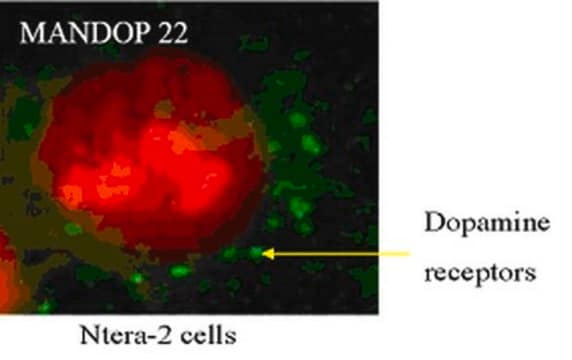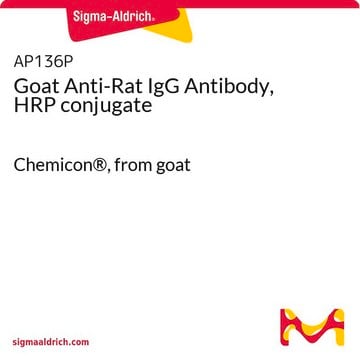MAB8754
Anti-Eastern Equine Encephalitis Antibody, Virus, clone 1A4B.6
clone 1A4B.6, Chemicon®, from mouse
Synonym(s):
EEE
Sign Into View Organizational & Contract Pricing
All Photos(1)
About This Item
UNSPSC Code:
12352203
eCl@ss:
32160702
NACRES:
NA.41
Recommended Products
biological source
mouse
Quality Level
antibody form
purified immunoglobulin
clone
1A4B.6, monoclonal
species reactivity
human
manufacturer/tradename
Chemicon®
technique(s)
ELISA: suitable
immunofluorescence: suitable
inhibition assay: suitable (hemagglutination)
isotype
IgG2b
shipped in
wet ice
Specificity
The MAb 1A4B-6 is an IgG2b antibody that reacts with an
E1 epitope shared by all alphaviruses. Encephalitis Virus: Strains Indentified:
Eastern Equine (EEE) N. American eastern equine (NJ/60);
S. American eastern equine (BeAn 5122)
Western Equine (WEE) Western equine (McMIllan); Highlands J (B-230);
Sindbis
Semliki Forest Semliki Forest
Venezuelan Equine (VEE) 1AB (TC-83 Vaccine, Trinidad Donkey, PTF-39);
1C (P676); 1D (3880); 1E ( Mena II);
1F(78V-3531); 2 (Fe3-7c); 3 (Mucambo);
4 (Pixuna); 5 (Cabassou)
E1 epitope shared by all alphaviruses. Encephalitis Virus: Strains Indentified:
Eastern Equine (EEE) N. American eastern equine (NJ/60);
S. American eastern equine (BeAn 5122)
Western Equine (WEE) Western equine (McMIllan); Highlands J (B-230);
Sindbis
Semliki Forest Semliki Forest
Venezuelan Equine (VEE) 1AB (TC-83 Vaccine, Trinidad Donkey, PTF-39);
1C (P676); 1D (3880); 1E ( Mena II);
1F(78V-3531); 2 (Fe3-7c); 3 (Mucambo);
4 (Pixuna); 5 (Cabassou)
Immunogen
Epitope: Virus
Application
Detect the Eastern Equine Encephalitis protein using this Anti-Eastern Equine Encephalitis, Virus, clone 1A4B.6 validated for use in ELISA, IF & Hemagglutination Inhibition.
ELISA
Indirect Immunofluorescence
Hemagglutination Inhibition
Optimal working dilutions must be determined by end user.
Indirect Immunofluorescence
Hemagglutination Inhibition
Optimal working dilutions must be determined by end user.
Physical form
Format: Purified
Purified immunoglobulin. Liquid in PBS with 0.1% Sodium Azide.
Storage and Stability
Maintain at 2 to 8°C for up to 12 months from date of receipt.
Other Notes
Concentration: Please refer to the Certificate of Analysis for the lot-specific concentration.
Legal Information
CHEMICON is a registered trademark of Merck KGaA, Darmstadt, Germany
Storage Class Code
10 - Combustible liquids
WGK
WGK 2
Flash Point(F)
Not applicable
Flash Point(C)
Not applicable
Certificates of Analysis (COA)
Search for Certificates of Analysis (COA) by entering the products Lot/Batch Number. Lot and Batch Numbers can be found on a product’s label following the words ‘Lot’ or ‘Batch’.
Already Own This Product?
Find documentation for the products that you have recently purchased in the Document Library.
Marcel Kruchelski Tschá et al.
Virus evolution, 7(2), veab105-veab105 (2022-03-22)
Genomic and epidemiological surveillance are paramount for the discovery of new viruses with the potential to cross species barriers. Here, we present a new member of the genus Alphavirus found in Trichoprosopon and Wyeomia mosquitoes, tentatively named Pirahy virus (PIRAV).
Pan Yang et al.
Nature communications, 15(1), 6548-6548 (2024-08-03)
Eastern equine encephalitis virus (EEEV) is the most virulent alphavirus that infects humans, and many survivors develop neurological sequelae, including paralysis and intellectual disability. Alphavirus spike proteins comprise trimers of heterodimers of glycoproteins E2 and E1 that mediate binding to
Japanese encephalitis among hospitalized pediatric and adult patients with acute encephalitis syndrome in Hanoi, Vietnam 1995.
Lowry, P W, et al.
The American Journal of Tropical Medicine and Hygiene, 58, 324-329 (1998)
Brandon J Beddingfield et al.
NPJ vaccines, 9(1), 47-47 (2024-02-28)
MVA-based monovalent eastern equine encephalitis virus (MVA-BN-EEEV) and multivalent western, eastern, and Venezuelan equine encephalitis virus (MVA-BN-WEV) vaccines were evaluated in the cynomolgus macaque aerosol model of EEEV infection. Macaques vaccinated with two doses of 5 × 108 infectious units
Detection of eastern equine encephalitis virus in infected mosquitoes using a monoclonal antibody-based antigen-capture enzyme-linked immunosorbent assay
Brown, T M, et al
The American Journal of Tropical Medicine and Hygiene, 65, 208-213 (2001)
Our team of scientists has experience in all areas of research including Life Science, Material Science, Chemical Synthesis, Chromatography, Analytical and many others.
Contact Technical Service








